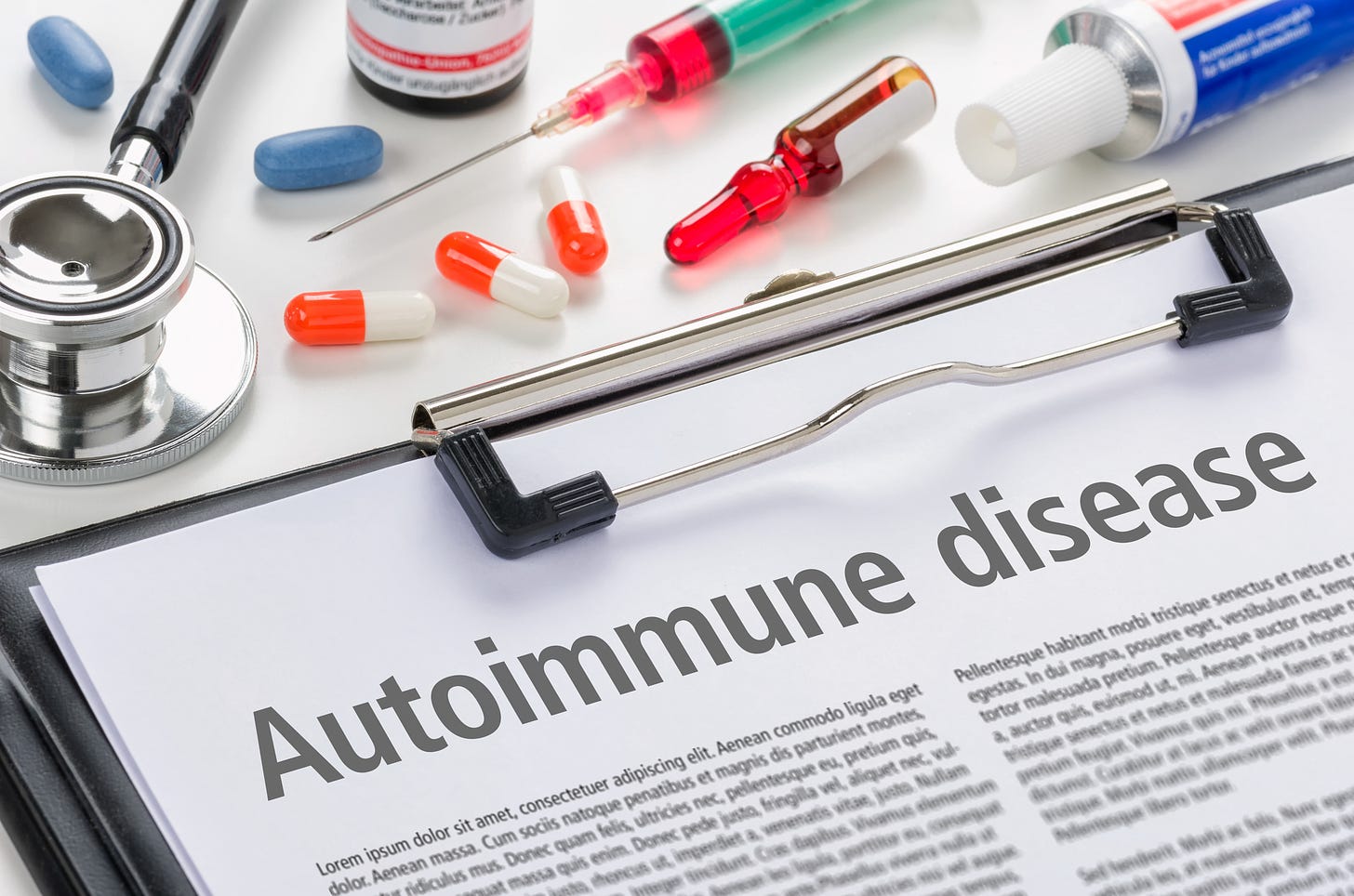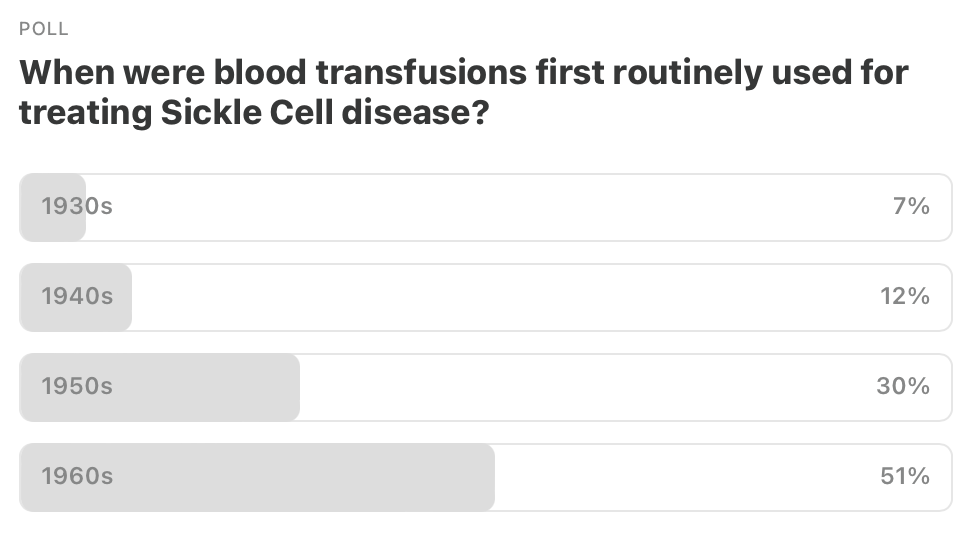Vaccines may have eliminated the increased risk of autoimmune conditions after Covid-19 infection during the Omicron era. (Yes, Florida.)
That and other stories in "Five on Friday" for September 13, 2024...
Item 1: Study: Vaccines may have eliminated the increased risk of autoimmune conditions after Covid-19 during the Omicron era. Can someone please tell the Surgeon General of Florida?
Early in the Covid-19 pandemic, the rate of some autoimmune conditions after SARS-CoV-2 infection was found to be elevated. Those conditions ranged from arthritis to lupus to vasculitis. However, the studies establishing the hypothesis that SARS-CoV-2 infection conferred an increased risk of autoimmune conditions occurred during the pre-vaccine era (or during periods when the vaccination rate was very low).
Many of us want to know whether infections today—in the vaccine and Omicron era—carry increased risks of developing one of these autoimmune conditions. To gain insight, researchers in Singapore studied over 1.7 million adults who were infected either with the Delta or Omicron variant of SARS-CoV-2, by when most of that population had received two or three doses of an mRNA vaccine. The findings, published in JAMA Network Open are reassuring. The long-term risk of autoimmune conditions in SARS-CoV-2 infected people was not elevated compared to uninfected controls except among patients sick enough to be hospitalized during the Omicron wave, in whom small increases were seen for inflammatory bowel disease and bullous skin disorders (a condition that causes some skin vesicles). However, the effect size here should be noted; among hospitalized patients during the Omicron wave, the “excess burden” of inflammatory bowel disease corresponded to one extra case for every 562 people (in comparison to similar controls). Again, for people who were not sick enough to be hospitalized, there was no increase in autoimmune conditions.
This is great news, as it suggests that our immunity from vaccines protects us in various ways. Unfortunately, the Surgeon General of the state of Florida has not kept up with the data. An advisory issued there states that mRNA vaccines for Covid-19 could increase autoimmune conditions. The data relied on for that claim were incorrectly interpreted—and that was before this new study in JAMA Network Open which outright refutes it.
Item 2: H5N1 wastewater levels in Texas did not correlate with influenza hospitalizations.
A new study in the New England Journal of Medicine reports that H5N1 (the highly pathogenic avian influenza virus that has infected 202 herds of cattle across 14 US states this year) has been alarmingly common in Texas wastewater during 2024.
There’s good news though: This is an example of wastewater surveillance doing its job—alerting us to a problem larger than we might otherwise be able to detect with direct animal (or human) testing. The other good news is that the wastewater levels did not correlate with influenza hospitalizations, meaning that it is unlikely that many people have been affected.
Unfortunately, all of the wastewater detection of H5N1 occurred in the spring and summer, times when influenza has a hard time spreading in humans. Whether the fall and winter portends more human disease and human-to-human spread remains to be seen.
Item 3: Semaglutide not linked to suicide risk in large observational study.
Of the many effects semaglutide (Ozempic and Wegovy) might have, one area that is wide open is mental health. Some believe these drugs may protect against depression, while others fear the opposite. Not enough is known, though if there were a major signal either way, the clinical trials might have shown that. For example, the blockbuster SELECT trial tracked “psychiatric disorders” among semaglutide and placebo recipients and found no difference (0.7% and 0.6% respectively, which were not statistically different).
But for suicide mortality, less is known. A new study in JAMA Internal Medicine looked for a change in suicide rates in patients with diabetes who started taking semaglutide (and other drugs like it) compared to matched controls who used a different class of diabetes drug during the same period. The study looked at a cohort of 298,553 adults in Sweden and Denmark and found no increase in suicide mortality among semaglutide recipients. Of semaglutide recipients, 0.06% died by suicide during the 2.5 year follow up period, compared with 0.04% in controls, a difference that was not statistically meaningful.
While prone to confounding variables, observational datasets like the one described in this new study carry an advantage in their sheer size, allowing researchers to track low frequency events like suicide. These are not definitive data but they are reassuring for anyone worried about this issue.
Item 4: High doses of Adderall associated with psychosis and mania, study suggests.
Millions of people in the US take stimulants for attention deficit hyperactivity disorder (ADHD), including children, adolescents, and young adults. These medications are generally safe, although not without some risks. For example, one prominent research group found no increase in the risk of cardiovascular problems in the short-run, but later found increased risk in a study with longer-term follow up.
Like all medications, there are some patients for whom the risks outweigh the benefits. A new study in the American Journal of Psychiatry found that among younger patients (ages 16-35) admitted to an inpatient psychiatric hospital, there was an association between high doses of prescription amphetamine (e.g., Adderall) and psychosis or mania. The association was not seen in patients who took lower doses, or in those who took other stimulants like methylphenidate (e.g., Ritalin).
What we don’t know is why. Did amphetamine use cause or contribute to the patients’ manic or psychotic episodes? One piece of data supporting that is a “dose response” relationship—that is, the higher the dose the patient was taking, the likelier manic or psychotic episodes were.
The study also could not identify which patients might be at risk of these outcomes. Again, millions of people take these medications on a daily basis. Only a small fraction experience concerning side effects, let alone psychiatric illnesses sufficient to warrant inpatient level of care. But this study suggests that researchers may eventually be able to tease out who is at risk, thereby preventing these events by keeping doses lower, or choosing alternative treatments.
Item 5: Poll of the Week.
Here are the results from the last poll. Thanks for your votes! The correct answer is the 1960s!
Item 5a: Poll of the Week for this week!
Medical trivia time. No Google or other resources allowed!
That’s it. Your “Friday Five!” Questions? Comments? Please chime in!
Feedback! Have any ideas for next week’s Poll of the Week? Any great articles you have read elsewhere that you want to share with the Inside Medicine community?







Florida's Surgeon General if not replaced in the past 18 mo's (?) is the same misguided (being kind) that also did nothing to contain measles infections...OMG
Maybe he's Bud's with the celebrity idiot (once again kind) that is trying to get elected & added sadness the governor drinks the same Kool aid being served up by the afore mentioned idiot...☹️
Typical misinformation from Ladapo, who has criticized masking and promoted hydroxychloroquine for Covid…